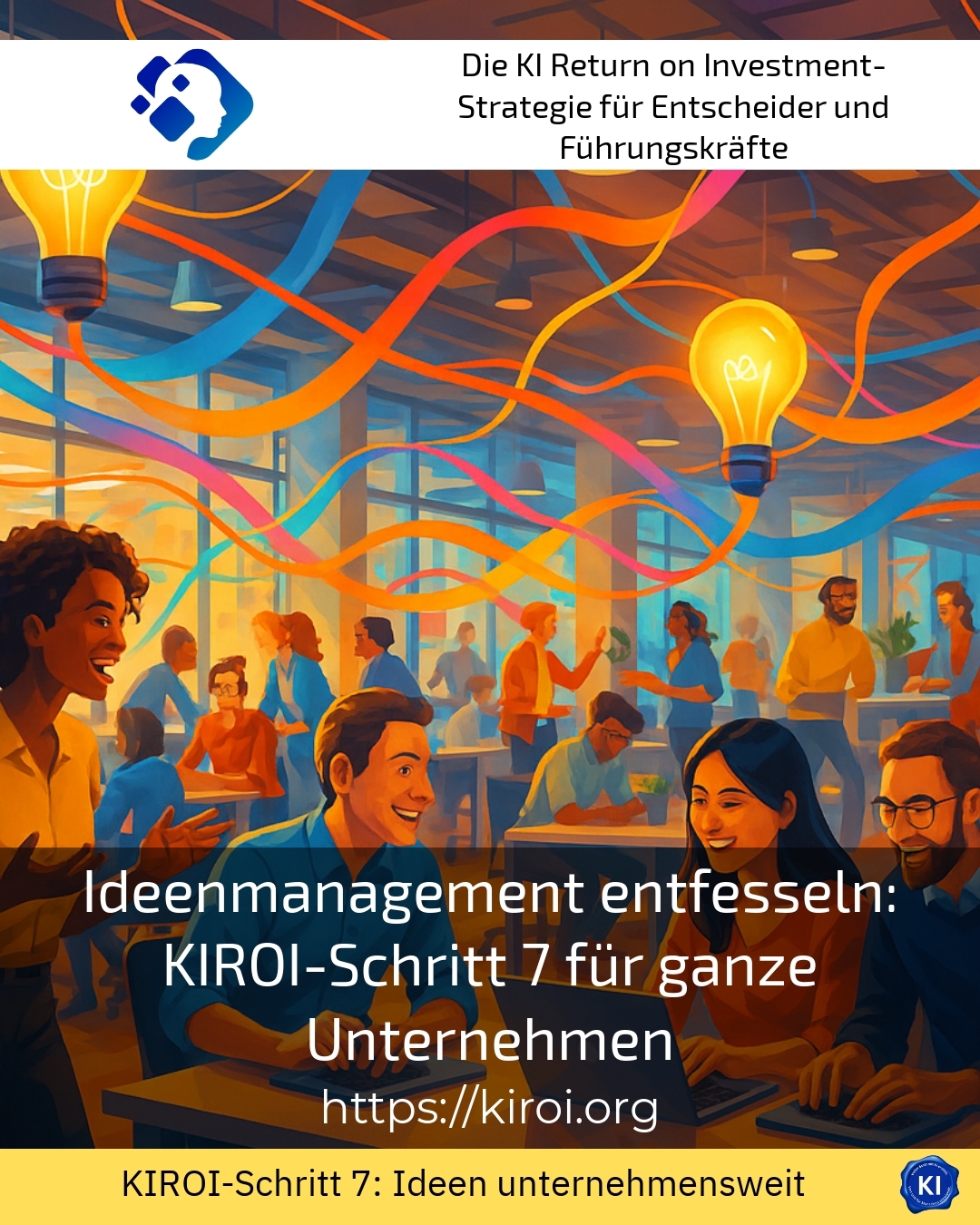Idea management is a central building block for companies that want to strengthen innovation and collaboration. KIROI Step 7, which serves as an important driver to systematically support ideas and unleash them sustainably throughout the entire organisation, is a particular focus here. This step addresses the key challenges in the ideas process and supports organisations in identifying barriers at an early stage and actively shaping the feedback mechanism. In this way, idea management is understood not just as a pure collection process, but as a living culture that promotes creativity and actively supports success.
Idea management as a continuous companion in the company
Many companies are realising that idea management needs to be more than just a creative collection of suggestions. KIROI Step 7 helps to systematically support the process beyond the mere submission of ideas. This means that creative impulses are not only recorded, but actively supported and integrated into the day-to-day running of the company. The promotion of a transparent and appreciative feedback culture plays a decisive role here.
In the mechanical engineering industry, for example, regular moderated workshops show how development loops can be significantly reduced. Employees from different departments exchange ideas more intensively, allowing innovative solutions to be implemented more quickly. Software development companies also report improved team structures, as idea management noticeably strengthens collaboration through constant support and feedback processes. And in the retail sector, more and more companies are using digital platforms to systematically record, evaluate and transparently manage ideas.
BEST PRACTICE with one customer (name hidden due to NDA contract) In a manufacturing company, KIROI Step 7 introduced a strategy for identifying and overcoming obstacles to the realisation of ideas. Barriers were broken down with the help of targeted workshops. This led to faster project realisation and better interdisciplinary exchange, which measurably increased innovative strength.
The role of feedback in modern idea management
A central aspect of KIROI step 7 is the establishment of a transparent feedback process. An open feedback culture makes employees feel that they are taken seriously and motivated to contribute their ideas. In large organisations in particular, it is important that feedback is provided in a structured and timely manner. This avoids unnecessary waiting times and maintains the flow of innovation.
In the automotive industry, teams report that continuous feedback has broken down creative blockades. In the IT sector, clear feedback loops supported the implementation of complex features. And in the service sector, operational feedback rounds significantly improved customer satisfaction because suggestions could be realised more quickly.
Practical tips for idea management support
If you want to unleash ideas management in your company in the long term, you can use the following approaches as impulses:
- Regular workshops and interdisciplinary dialogue rounds to identify challenges at an early stage.
- Introduction of digital feedback and tracking tools to make the process transparent and comprehensible.
- Employee training on how to deal with feedback in order to promote an appreciative communication culture.
- Promoting managers as active providers of ideas and facilitators within the process.
In the logistics sector, a combination of digital platforms and targeted coaching helped to significantly increase the speed of implementation of process improvements. In the pharmaceutical sector, trained moderators ensured that even complex ideas could be realised in clear steps. And in the financial sector, the involvement of external stakeholders through open innovation formats supports the flow of ideas across company boundaries.
KIROI step 7 as the key to sustainable innovation
With its focus on support, feedback and transparent structures, KIROI Step 7 fundamentally changes the understanding of idea management. It promotes a culture of openness and co-creation. In this way, companies not only deal confidently with the challenges of the present, but also create a flexible basis for future developments.
BEST PRACTICE with one customer (name hidden due to NDA contract) A service provider from the technology sector has improved interdisciplinary dialogue through KIROI Step 7. Workshops and coaching helped the teams to recognise obstacles early on and solve them together. The result is a sustainable innovation process that strengthens competitiveness and increases employee loyalty.
This makes idea management a lively companion in everyday business life. Clients often report that it is precisely the customised support that opens up new perspectives and encourages them to find their own solutions - even for complex challenges.
My analysis
KIROI step 7 shows how important it is to understand idea management not just as a collection, but as an active and accompanying process. Companies benefit from a transparent feedback culture and targeted support. This not only unleashes creativity, but also accelerates the realisation of the best ideas. The practical examples from a wide range of industries illustrate that the combination of workshops, digital support and personal coaching in particular provides impetus that holistically strengthens innovative power.
Unleashing idea management therefore means creating space in which ideas can grow and be realised. KIROI Step 7 provides a valuable concept that accompanies companies on the path to sustainable innovation.
Further links from the text above:
Rethinking ideas management: KIROI step 7 in the company
KIROI step 7 for company-wide ideas - SAULDIE
How to strategically organise your idea management in 7 steps
Structured idea management with Jira Product Discovery
What is idea management and what contribution can it make - Qmarkets
For more information and if you have any questions, please contact Contact us or read more blog posts on the topic Artificial intelligence here.















